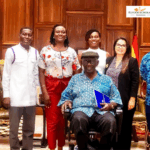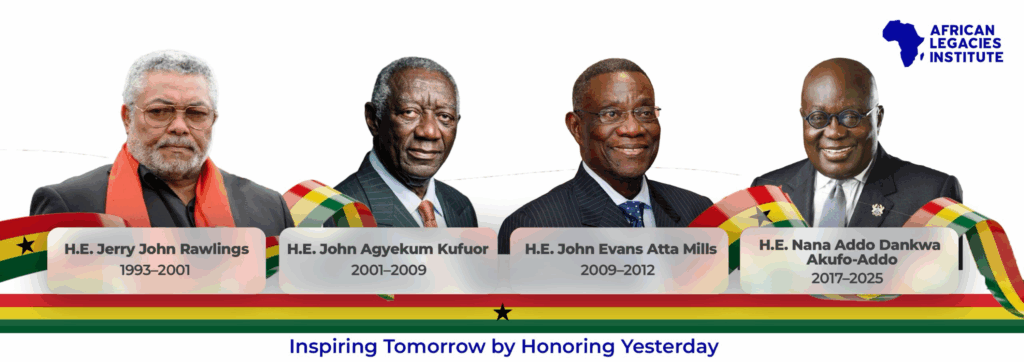
The African Legacies Institute (ALI) has begun a Pan-African initiative in Ghana aimed at preserving the leadership histories and enduring legacies of the country’s former Heads of State.
This forms part of ALI’s broader continental mission to safeguard Africa’s governance heritage, democratic progress, and record of peaceful transitions.
As one of Africa’s most stable constitutional democracies, Ghana is the first country where ALI is undertaking structured legacy documentation.
The process includes gathering archival materials, speeches, policy records, photographs, audiovisual content, and post-presidency work that reflect each leader’s contribution to national development.
The documentation in Ghana will encompass the legacies of the nation’s former leaders who have contributed to its democratic consolidation and development: Jerry John Rawlings, John Agyekum Kufuor, John Evans Atta Mills, and Nana Addo Dankwa Akufo-Addo.
Through this effort, ALI seeks to ensure that the leadership journeys of these statesmen, their policies, and their impact on Ghana’s governance evolution are preserved with accuracy, dignity, and accessibility for future generations.
ALI is compiling a comprehensive record on John Agyekum Kufuor, whose presidency marked a significant period of transformation in Ghana.
His administration oversaw major economic reforms, including the Highly Indebted Poor Countries (HIPC) initiative, which enabled Ghana to secure debt relief and strengthen macroeconomic stability.
Under his leadership, the National Health Insurance Scheme (NHIS) was introduced, expanding access to healthcare for millions of Ghanaians.
Beyond domestic reforms, Kufuor played a prominent role in regional diplomacy.

He contributed to peacebuilding efforts in Liberia, Sierra Leone, Kenya and Côte d’Ivoire, and served as Chairperson of ECOWAS from 2003 to 2004 and later Chairperson of the African Union from 2007 to 2008, elevating Ghana’s position in international affairs.
His governance record and global engagements earned him international recognition, including the World Food Prize in 2011 for leadership in reducing hunger and poverty.
In his post-presidency, John A. Kufuor has remained deeply committed to national development through the work of the John A. Kufuor Foundation.
The Foundation promotes leadership development, good governance, and youth empowerment, values that are strongly aligned with the African Legacies Institute’s mission to document and advance the legacy of Africa’s democratic leaders.
To further consolidate and entrench its transformational leadership agenda, the John A Kufuor Foundation birthed the Kufuor Scholars Program (KSP). The KSP was designed to mentor a critical mass of future change agents.
The program aims to instil in young people a strong sense of patriotism and nurture leaders who are innovative, ethically grounded, and professionally equipped to excel in their various fields.
This year marks the 10th anniversary of the KSP, and in expanding its reach, the program has opened its doors to students from across the African continent.
In addition, through initiatives such as the Kufuor Young Leaders Programme (KYLP), the Kufuor Policy Centre, and projects promoting climate-smart agriculture and entrepreneurship, the Foundation continues to shape Ghana’s next generation of ethical, service-oriented leaders.
Speaking from Accra, Franya E. Cabral Ruiz, Founding Partner of the African Legacies Institute, emphasised the importance of preserving accurate and accessible leadership history as Africa navigates a rapidly changing information environment.
She noted that ALI’s work is designed to counter the erosion of institutional memory, strengthen democratic education, and ensure future generations have access to verified historical records.

